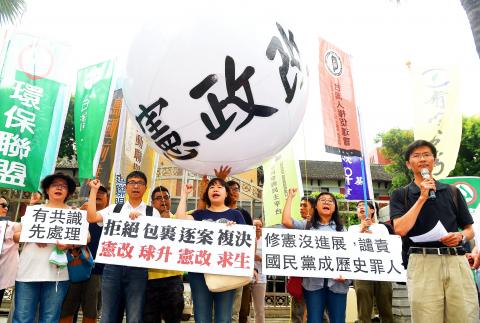Interparty negotiations on constitutional amendments broke down yesterday, despite attempts at mediation by Legislative Speaker Wang Jin-pyng (王金平).
The Chinese Nationalist Party (KMT) and the Democratic Progressive Party (DPP) were divided because of the KMT caucus’ insistence that the legislature’s power to confirm the premier be bundled with the issue of absentee voting.
The parties had previously achieved consensus on lowering the legal voting age to 18, lowering the threshold for legislators-at-large from 5 percent to 3 percent and guarantees of education for residents of outlying islands.

Photo: Chien Jung-fong, Taipei Times
The DPP blasted the KMT for saying that, if absentee voting were not bundled with legislative powers to approve the premier, it would block all constitutional amendments.
This kind of rhetoric is akin to threatening society to submit to the KMT’s views on constitutional amendments, the DPP said.
No political party should attempt to distort the public’s will by forcibly bundling amendment issues, DPP Secretary-General Joseph Wu (吳釗燮) said, adding that the KMT is hampering the nation’s progress by refusing to let individual amendments pass to facilitate constitutional reform.
While DPP Chairperson Tsai Ing-wen (蔡英文) on Sunday called on Deputy Legislative Speaker Hung Hsiu-chu (洪秀柱) to exercise her influence within the KMT and stop it from blocking the amendments, KMT Culture and Communications Committee Director-General Lin Yi-hua (林奕華) yesterday said that Tsai and the DPP’s focus on the civil rights of 18-year-olds is too narrow, and does not take into consideration the expectations of the majority of society.
There is more support — 70 percent — for the Legislative Yuan being able to confirm future premiers, Lin said, adding that the DPP should not seek to promote its own political agenda when calling for constitutional amendments.
Lin said 60 percent of the public support absentee voting and 50 percent support lowering the legal voting age, and that the KMT is seeking to preserve the rights of 18-year-old citizens, as some might not be able to vote because they are studying abroad
The KMT hopes to achieve more with its proposal because only a complete and well-thought-out plan would help 18-year-old citizens retain their civic rights and duty to vote in elections, Lin said.
Lin accused Tsai of ignoring popular support for the Legislative Yuan confirming future premiers despite her constant talk about Taiwanese democracy.
Meanwhile, civic organizations pushing for constitutional amendments held news conferences in front of the Legislative Yuan yesterday morning criticizing the KMT’s insistence on bundling absentee voting with the right to confirm the premier.
The KMT is hijacking the issue of voting rights of 18-year-olds solely for its own political benefit, the organizations said, urging the party to stop blocking an issue that the public long ago achieved a consensus on.

AGING: As of last month, people aged 65 or older accounted for 20.06 percent of the total population and the number of couples who got married fell by 18,685 from 2024 Taiwan has surpassed South Korea as the country least willing to have children, with an annual crude birthrate of 4.62 per 1,000 people, Ministry of the Interior data showed yesterday. The nation was previously ranked the second-lowest country in terms of total fertility rate, or the average number of children a woman has in her lifetime. However, South Korea’s fertility rate began to recover from 2023, with total fertility rate rising from 0.72 and estimated to reach 0.82 to 0.85 by last year, and the crude birthrate projected at 6.7 per 1,000 people. Japan’s crude birthrate was projected to fall below six,

US President Donald Trump in an interview with the New York Times published on Thursday said that “it’s up to” Chinese President Xi Jinping (習近平) what China does on Taiwan, but that he would be “very unhappy” with a change in the “status quo.” “He [Xi] considers it to be a part of China, and that’s up to him what he’s going to be doing, but I’ve expressed to him that I would be very unhappy if he did that, and I don’t think he’ll do that. I hope he doesn’t do that,” Trump said. Trump made the comments in the context

SELF-DEFENSE: Tokyo has accelerated its spending goal and its defense minister said the nation needs to discuss whether it should develop nuclear-powered submarines China is ramping up objections to what it sees as Japan’s desire to acquire nuclear weapons, despite Tokyo’s longstanding renunciation of such arms, deepening another fissure in the two neighbors’ increasingly tense ties. In what appears to be a concerted effort, China’s foreign and defense ministries issued statements on Thursday condemning alleged remilitarism efforts by Tokyo. The remarks came as two of the country’s top think tanks jointly issued a 29-page report framing actions by “right-wing forces” in Japan as posing a “serious threat” to world peace. While that report did not define “right-wing forces,” the Chinese Ministry of Foreign Affairs was

PREPAREDNESS: Given the difficulty of importing ammunition during wartime, the Ministry of National Defense said it would prioritize ‘coproduction’ partnerships A newly formed unit of the Marine Corps tasked with land-based security operations has recently replaced its aging, domestically produced rifles with more advanced, US-made M4A1 rifles, a source said yesterday. The unnamed source familiar with the matter said the First Security Battalion of the Marine Corps’ Air Defense and Base Guard Group has replaced its older T65K2 rifles, which have been in service since the late 1980s, with the newly received M4A1s. The source did not say exactly when the upgrade took place or how many M4A1s were issued to the battalion. The confirmation came after Chinese-language media reported